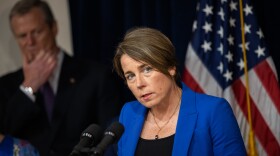Remote online access to government emerged out of necessity as the pandemic set in, allowing residents to watch or participate in all sorts of meetings and hearings on Beacon Hill. Recently, the elected group that vets judicial candidates, the Governor's Council, has dropped their livestream in favor of a traditional pre-pandemic format.
Matt Murphy with the State House News Service explained it is unlikely more government bodies return to this kind of in-person only access.
Matt Murphy, State House News Service: I think the switch that we're seeing at the Governor's Council back to the way it used to be done might be an outlier in this case. The continuation of online access to committee hearings and all kinds of other public events, legislative briefings and other forums for panel discussions has been very popular during the pandemic and something I think lawmakers have really embraced.
We know when legislative leaders announced the reopening of the Statehouse a few weeks ago, they were insistent that these sorts of reforms and changes that occurred under the pandemic were going to continue. It was not long before they dropped the imposed vaccine and mask mandates in the building and really fully opened the building back up to the public, which could be a precursor for changing that, but we have not seen a shift as of late. And I don't think it's going to change any time soon, given that many hearings are already done for the two-year cycle, and we wouldn't see that kick up again until 2023.
So I think they'll take some time, but a lot of investment made in the technology to make these sorts of things happen. And, like I said, they were popular and lawmakers enjoyed them. They got to benefit from the remote access as well, and I think that's something we're going to continue to see.
Carrie Healy, NEPM: Last week, Governor Charlie Baker filed a $9.7 billion transportation and infrastructure bond bill. Among other things, it proposes directing more than $2 billion to the MBTA in Boston. Is there enough else in that document that benefits residents across the state and here in western Mass. to win the approval of lawmakers?
Yes, these bills tend not to be controversial. It's just a matter of what additional things get added to this. Bond bills, these long-term borrowing authorizations for the governor, tend to get loaded up with local projects by lawmakers as they move through the process, and that's likely to occur here as well.
But there's also plenty of money in here for things like highway improvements across the state. There's tens of millions of dollars that will be put into regional transit authorities, which would benefit communities in the western and central parts of the state. There's money to rebuild the Worcester rail station in that central Mass. city.
So it is not entirely concentrated in the eastern part of the state, though there are some big-ticket items, as you mentioned, for the MBTA and other projects in and around Boston. But I think we're likely to see, as this bill moves through the process, more money gets spread around.
And with very little fanfare, the state's paid COVID sick time program ended last week, as it had run out of money. Matt, as you know, COVID is still here. Did state lawmakers plan for additional funds for that program and have there been any calls made to extend it in any way?
We have not heard a lot of talk about this program of late. There was additional money put into this. This, of course, was authorized back in 2021. They extended — from the first time it was created in the spring — extended, I believe, last September through to this March. And just back in February, lawmakers put an additional $25 million into this fund to support workers and the employers who are paying out the paid time off. The application window extends beyond that, I believe, into April, where workers can still make claims from this fund.
But you're right that COVID-19 is not over and it might not be the last that we've heard from this program. There are some other bills that are still moving where they could tack on an extension, as we've seen them extend other COVID-era programs, such as things like outdoor dining for restaurants. So I would keep an eye on this one.







